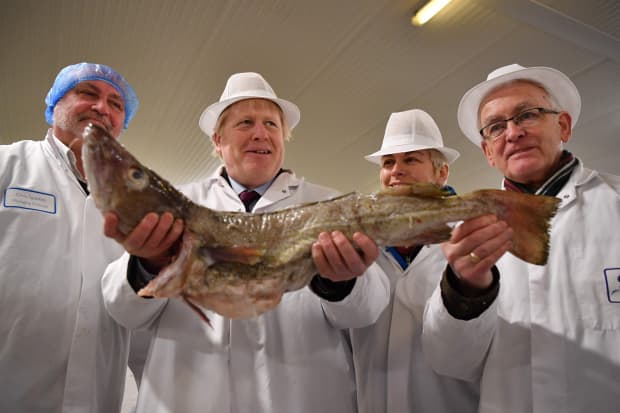This post was originally published on this site

U.K. Prime Minister Boris Johnson poses holding a cod during a general election campaign visit to Grimsby Fish Market in northeast England, on Dec. 9, 2019.
ben stansall/Agence France-Presse/Getty Images
The U.K. and the European Union warned each other on Monday that their negotiators are “running out of time” to conclude an agreement on their future trade relationship, once the U.K. leaves Europe’s single market on Dec. 31.
- Leaks from both sides suggested that the minor economic issue of fishing rights in British waters still proved unsurmountable after 10 months of talks, as possible compromises had emerged on other more important problems, such as “level playing field” rules on environmental or social matters.
- EU chief negotiator Michel Barnier and his U.K. counterpart David Frost were still negotiating on Sunday. “I think there’s a deal to be done” U.K. foreign minister Dominic Raab said in an interview with Sky News.
- Even though fishing represents less than 0.1% of the U.K.’s annual gross domestic product, the U.K. government insists it wants to claim back the fishing rights held by other countries’ fleets in France or other coastal countries under current EU-wide agreements.
- “If there isn’t an agreement on this, the whole thing could fall on the back of it and that’s the worry,” said Irish foreign minister Simon Coveney on Sunday.
- The U.K. relies on imports for the fish it eats, and its fishermen depend on exports for their livelihood. U.K. imports of cod and haddock — the species most used in the national fish and chips meal — amounted to £655 million, or 28% of all U.K. fish imports in 2018, according to government numbers. Exports of the same, at £63 million, were marginal. Meanwhile, the fish-trade balance is positive for other species, such as salmon. The U.K. imports the fish it eats and exports those it doesn’t.
From the archives (June 2020): U.K. Asks Consumers to Go Easy on Fish & Chips. It’s All About Brexit. But There’s a Catch.
The outlook: Deadlines have come and gone in the last 10 months, but the legal calendar now only leaves a few days for both sides to strike a deal in time for its ratification by parliaments. You can still expect showmanship until the last minute.
But the mood on the EU side in the last few days is one of resignation to the possibility that London might ultimately refuse to sign a deal, as symbolic and political considerations seem to trump substantive and economic ones.
Read: Piste-off: EU attempts united front to close ski resorts and prevent COVID

